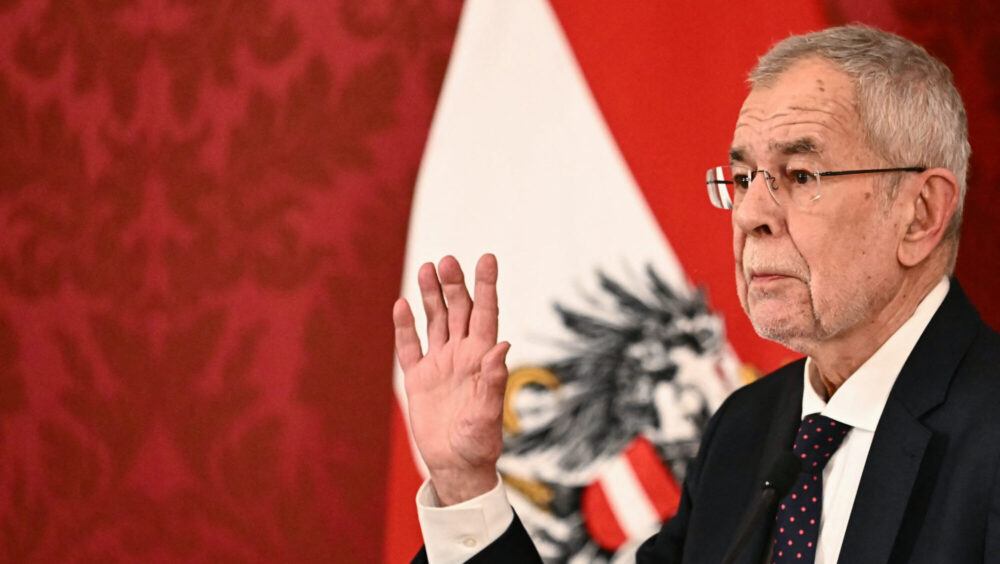
Austria’s President Alexander van der Bellen
Joe Klamar / AFP
The right-wing Freedom Party (FPÖ) and the centre-right People’s Party (ÖVP) have blamed each other for the collapse of talks to form the next Austrian government.
FPÖ leader Herbert Kickl said on Wednesday evening, February 12th that the main disagreements had not been on issues but rather the distribution of portfolios among the two parties.
The ÖVP, despite coming only second in the elections in September, had been insistent on getting the six of the seven most significant ministries: foreign affairs, internal affairs, finance, economy, agriculture, and defence.
They also demanded that the justice department be led by someone l not affiliated with either of the two parties, meaning the chancellery would have been the only important office held by the FPÖ.
The ÖVP leadership was also adamant that EU affairs should no longer be the responsibility of the chancellery but be foreign ministry controlled—i.e., by the People’s Party.
Wir Freiheitliche wollten Österreich zurück an die Spitze Europas führen, wirtschaftlich stark, sozial verantwortungsbewusst und mit einer Migrationspolitik, die die Interessen unseres Landes und seiner Menschen schützt. Obwohl wir der ÖVP in vielen Punkten entgegengekommen sind,…
— FPÖ (@FPOE_TV) February 12, 2025
As Kickl pointed out, the People’s Party wanted to keep the same ministries it had controlled during the previous government that it led together with the Greens. The ÖVP had rightly claimed those positions as it had won the 2019 elections with a convincing 37.5% of the votes. However, in the elections last September, it only received 26.3%, and the winner was the FPÖ with 28.8%.
At a press conference on Wednesday, Kickl called the ÖVP’s proposals “imbalanced,” and reiterated his insistence on the FPÖ taking control of both the interior ministry and the finance ministry because there was a need for a U-turn on migration and budgetary policies. The Freedom Party had been campaigning on the need to reduce public debt, and to halt illegal migrants at Austria’s borders.
With regards to the EU, the eurosceptic-sovereignist FPÖ wanted to be responsible for EU affairs, as it disagrees with the current course of the European Union and the handing over of national competencies to EU institutions. Kickl stressed that he is committed to a pro-European course, “but not to submitting to the requirements of the EU institutions,” because Austria is “not a branch of the Brussels headquarters.”
“The old ways have led to disastrous results, from which Austrians suffer every day,” Kickl said, warning that the ÖVP will now try to resurrect their grand coalition with the Social Democrats—a format that dominated Austrian politics for many decades—to prevent early elections.
The ÖVP, on the other hand, blamed “Kickl’s thirst for power and uncompromising attitude” for the failure of talks. They said the FPÖ had not addressed demands on fundamental issues it made from the outset, such as keeping Austria free from Russian influence, ensuring the rule of law or being a “reliable partner” within the EU.
Der Vorwurf, dass es der @volkspartei nur um den Machterhalt gehen würde, ist nicht haltbar. Wir haben mehr als vier Wochen lang ernsthaft und konstruktiv mit der FPÖ verhandelt und waren bereit, auf das Kanzleramt zu verzichten. Dass die Verhandlungen gescheitert sind, liegt an…
— Christian Stocker (@_CStocker) February 12, 2025
Austria’s President Alexander Van der Bellen said that he would be holding talks with the parties in the coming days to explore options for what a new government could look like. The other parties, the Social Democrats, the liberal NEOS, and the Greens have said they would be prepared to talk with the ÖVP. The president could also call early elections.
New elections would benefit the FPÖ: it is the uncontested frontrunner and is currently polling at 34%. Its drastic rise in the opinion polls since the September elections is a reflection of the mood in Austria: many voters are angered by the fact that Kickl’s party, the election winner, was not the first to be tasked by the country’s president, Alexander Van der Bellen to form a government.
Instead, the ÖVP, the Social Democrats, and the liberal NEOS party had spent months trying to cobble together a coalition, but their talks collapsed, prompting Van der Bellen in January to finally give Kickl a chance at forming a government.
The People’s Party has lost a lot of its support by first refusing to cooperate with the FPÖ, and then with its aggressive negotiation tactics. The party is currently polling at 19%. The Social Democrats have not managed to substantially improve on their election results either, gaining one percentage point to move up to 22%. Meanwhile, the Greens are at 10%, and NEOS at 9%.
